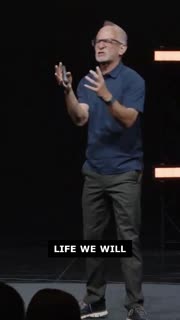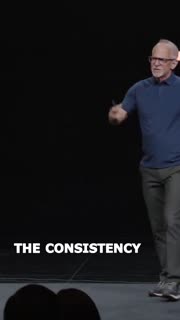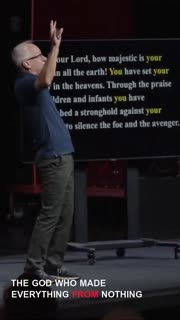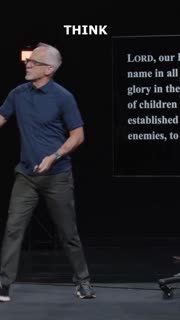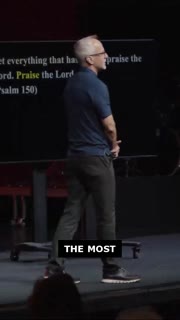Embracing Our Identity: Praise Through Life's Cycles
Devotional
Sermon Summary
Bible Study Guide
Sermon Clips
1. "And we're a royal priesthood. It's the priesthood of all believers. And we can all boldly enter his presence with thanksgiving, with confidence and assurance to find grace and mercy in our hour of need. But there's a reason, Peter tells us, why that is also so that we might declare the praises of him who called you and me out of darkness. Now that God has determined to call us, we should declare the goodness of who he is. So that everyone can experience what we've experienced." [15:19] (29 seconds)
2. "Music has a capacity to really begin in so many ways to be one of the primary definers of moments in life. If you think about it, music is used at funerals and weddings. You know, the peak experiences and the painful experiences, it's used. It's used at moments when graduations happen, as people are commencing into the next stage, and it happens while we're contemplative and wondering what has happened in our life, wondering what the next stage is. We celebrate with music. We commiserate with music." [33:18] (41 seconds)
3. "The beautiful thing about it is just like the music of our day, the music of that day is timeless. We don't necessarily have to know the historical circumstances in which it was written because the message is timeless. Its meaning is timeless. It's declaring the reality of what it means to be a human being. What it means to be a human being in all its greatness, all its glory, and all its gory. From the pit to the pinnacle, it's in there." [35:58] (30 seconds)
4. "And in this life we will get momentary tastes of being well and being whole. And being at peace with your fellow man and with your God. Where the best word to describe your life at any given moment would be harmony. There's just harmony. And in those moments he's gonna tell us, they are gonna tell us what we should do. But then we also know that in life there are substantial moments of disorientation. Where that compass that you had in your hand that you felt like it had you dialed in, it's now shattered and you have no idea where you are." [41:22] (36 seconds)
5. "And you'll see from the psalmist in this series that reorientation is not going to go back to the way it once was. It's actually going into a way it had never been. A way that had it not been for the adversity you would have never advanced into this season of life. That God isn't giving you back the life you once had. He's actually resurrected what once was just like when Christ was resurrected into a distinctively different container. So our life is resurrected into a season we would have never imagined even if we were here." [43:27] (33 seconds)
6. "Today's big idea, when our world is as it should be and there are moments when it is, your life will have moments where it is exactly as it should be. And you're gonna sense it and you're gonna feel it. And when we do, we should embrace it, we should milk it, and we should remember it. And the way we remember it is through these psalms of life. They're the key of life. And when we are, we must praise the one who made it that way." [46:09] (37 seconds)
7. "The consistency and constancy of life is not found in its situation. It is found in its creator. And when you and I find ourselves dialed in, that it just seems like, you know what? I'm in stride with life. Life seems to be a little bit easier to do today. And maybe you wake up, it's a little bit easier tomorrow. Don't take those moments for granted. See, most people in those moments are waiting for the other shoe to do what? Drop. You're waiting for it to end." [48:25] (36 seconds)
8. "The God who made everything from nothing has taken my nothing and made something out of it. And on this day, when I feel connected, when all feels right in my life and in my heart, well, praise God almighty. Right? And the word praise is hallelujah. Okay? So it's hallelujah. Hallelujah. Yah. It's a combination, a conjunction of two words. Halla. Shout. Yah, his holy name. We say hallelujah. It's shout his name. Declare his glory. From the rooftops and the mountaintops." [50:19] (37 seconds)
9. "And when you think about the language of a young child who's still of nursing age, one of the words literally means suckling, okay? So that's how young we're talking about. And when they begin to talk, it is incoherent. And yet it makes all of us laugh and giggle. In fact, it's so powerful that we will actually try and mimic the incoherent language. And don't pretend like you don't do it. Because as soon as you see a baby or a puppy, you begin to talk like some of you said I've never spoken tongues. Yes, you have. I have heard you." [51:55] (41 seconds)
10. "The most profound praise of God that will ever come out of a human being. Is when you declare with your mouth that Jesus Christ is Lord. That is the greatest praise of the almighty reality of our God. When you acknowledge that he is the sinless son of God. Who lived that perfect life that we just get glimpses of. But died a painful death. Because we ruined it. God didn't. But praise God almighty. The reorientation was far more glorious than the incarnation. Because he had conquered death. He had defeated Satan." [01:14:32] (56 seconds)
Ask a question about this sermon
2. "Music has a capacity to really begin in so many ways to be one of the primary definers of moments in life. If you think about it, music is used at funerals and weddings. You know, the peak experiences and the painful experiences, it's used. It's used at moments when graduations happen, as people are commencing into the next stage, and it happens while we're contemplative and wondering what has happened in our life, wondering what the next stage is. We celebrate with music. We commiserate with music." [33:18] (41 seconds)
3. "The beautiful thing about it is just like the music of our day, the music of that day is timeless. We don't necessarily have to know the historical circumstances in which it was written because the message is timeless. Its meaning is timeless. It's declaring the reality of what it means to be a human being. What it means to be a human being in all its greatness, all its glory, and all its gory. From the pit to the pinnacle, it's in there." [35:58] (30 seconds)
4. "And in this life we will get momentary tastes of being well and being whole. And being at peace with your fellow man and with your God. Where the best word to describe your life at any given moment would be harmony. There's just harmony. And in those moments he's gonna tell us, they are gonna tell us what we should do. But then we also know that in life there are substantial moments of disorientation. Where that compass that you had in your hand that you felt like it had you dialed in, it's now shattered and you have no idea where you are." [41:22] (36 seconds)
5. "And you'll see from the psalmist in this series that reorientation is not going to go back to the way it once was. It's actually going into a way it had never been. A way that had it not been for the adversity you would have never advanced into this season of life. That God isn't giving you back the life you once had. He's actually resurrected what once was just like when Christ was resurrected into a distinctively different container. So our life is resurrected into a season we would have never imagined even if we were here." [43:27] (33 seconds)
6. "Today's big idea, when our world is as it should be and there are moments when it is, your life will have moments where it is exactly as it should be. And you're gonna sense it and you're gonna feel it. And when we do, we should embrace it, we should milk it, and we should remember it. And the way we remember it is through these psalms of life. They're the key of life. And when we are, we must praise the one who made it that way." [46:09] (37 seconds)
7. "The consistency and constancy of life is not found in its situation. It is found in its creator. And when you and I find ourselves dialed in, that it just seems like, you know what? I'm in stride with life. Life seems to be a little bit easier to do today. And maybe you wake up, it's a little bit easier tomorrow. Don't take those moments for granted. See, most people in those moments are waiting for the other shoe to do what? Drop. You're waiting for it to end." [48:25] (36 seconds)
8. "The God who made everything from nothing has taken my nothing and made something out of it. And on this day, when I feel connected, when all feels right in my life and in my heart, well, praise God almighty. Right? And the word praise is hallelujah. Okay? So it's hallelujah. Hallelujah. Yah. It's a combination, a conjunction of two words. Halla. Shout. Yah, his holy name. We say hallelujah. It's shout his name. Declare his glory. From the rooftops and the mountaintops." [50:19] (37 seconds)
9. "And when you think about the language of a young child who's still of nursing age, one of the words literally means suckling, okay? So that's how young we're talking about. And when they begin to talk, it is incoherent. And yet it makes all of us laugh and giggle. In fact, it's so powerful that we will actually try and mimic the incoherent language. And don't pretend like you don't do it. Because as soon as you see a baby or a puppy, you begin to talk like some of you said I've never spoken tongues. Yes, you have. I have heard you." [51:55] (41 seconds)
10. "The most profound praise of God that will ever come out of a human being. Is when you declare with your mouth that Jesus Christ is Lord. That is the greatest praise of the almighty reality of our God. When you acknowledge that he is the sinless son of God. Who lived that perfect life that we just get glimpses of. But died a painful death. Because we ruined it. God didn't. But praise God almighty. The reorientation was far more glorious than the incarnation. Because he had conquered death. He had defeated Satan." [01:14:32] (56 seconds)



